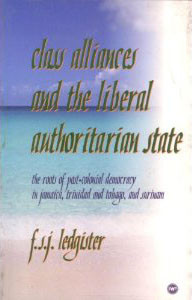Categories
Categories
Authors
Authors
- Home
- Politics/Political Science
- CLASS ALLIANCES AND THE LIBERAL AUTHORITARIAN STATE: The Roots of Post-colonial Democracy in Jamaica, Trinidad and Tobago, and Surinam, by F.S.J. Ledgister
CLASS ALLIANCES AND THE LIBERAL AUTHORITARIAN STATE: The Roots of Post-colonial Democracy in Jamaica, Trinidad and Tobago, and Surinam, by F.S.J. Ledgister
CLASS ALLIANCES AND THE LIBERAL AUTHORITARIAN STATE: The Roots of Post-colonial Democracy in Jamaica, Trinidad and Tobago, and Surinam, by F.S.J. Ledgister
Product Description
Conventional wisdom in the study of recently decolonized states holds that the British must have created the conditions for democracy in their former colonies, as these colonies are the only that have continuously exhibited democratic tendencies after independence.
The political evolution of three former colonies into independence and beyond is studied via an examination of the existing literature and through interviews with journalists, scholars, and politicians. These countries appear to uphold the conventional wisdom, since Jamaica and Trinidad and Tobago have been continuously democratic since independence, while Surinam has not.
It is clear from the author's research that the similarities in the political evolution of these countries far outweigh the differences. In particular, the British in Jamaica and Trinidad and Tobago, and the Dutch in Surinam developed similar developed similar state structures-- simultaneously liberal and authoritarian.
However, in two countries, Jamaica and Trinidad and TObago, the emergence of political parties was linked tot he labor protests, while this linkage, though not the protest, was absent in Surinam. Democratic politics in the former two countries turns out to rest on a two-way alliance between the middle and lower classes, embedded in a paternalistic state structure in herited from the colonial period. In Surinam, the absence of this alliance rendered democracy more vulnerable.
The author concludes that while the people's of the Caribbean did not fight long struggles for independence, they have been able to preserve the least poisoned gift of the colonizer- democracy.
ABOUT THE AUTHOR
F.S.J. LEDGISTER was educated at the University of the West Indies, new York University and the University of California, San Diego. He has worked as a journalist and teacher in Jamaica and the United States. Currently, he is assistant professor of Government at Morehead State University in Kentucky.
CATEGORY
Politics/CARIBBEAN
 Loading... Please wait...
Loading... Please wait... 


